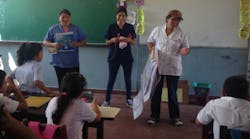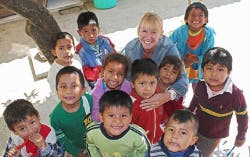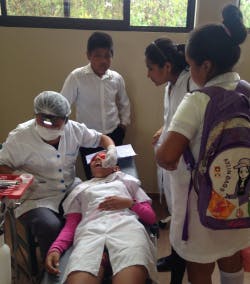Smiles Forever: Charity program emerged after American hygienist visited Bolivia
By Sandy Kemper, RDH
Congratulations new graduates, and those of you that have been in practice for a while, seasoned hygienists. Dental hygiene is a career I would chose over again and again. Having been a dental hygienist for over 40 years, my career has enriched my life in countless ways.
I always wanted to be in the medical field where I was caring for others. However, my orthodontist as a young adult highly recommended the field of dental hygiene and mentored me through the admission process. Allowing me to work in his office during high school intrigued me even more.
Dental hygiene school was not easy for me, but I had incredible fellow hygiene student friends. Having ADD (which I found out at the age of 40) prepared me to fail, pull my self up, and try again. We all studied, cried, and played together at the University of Iowa in Cedar Rapids.
After graduation, I returned to my home state of Washington to pass a rigorous final exam. Again, I had great teachers who believed in me from U of I. They prepared me for the Washington exam, which was much more difficult than the Midwest exam.
In my first years of clinical practice I was somewhat disappointed in my dental hygiene career. But moving to new dental offices and experiencing new clinical settings (staff, dentists, and patients) developed my self-confidence and piqued my interest to seek just the right clinical setting for me. I highly suggest to new graduates to work as a substitute hygienist until you find the right office to fit your personality. The patients that you will be working with will become lifelong friends as well as being your patients.
After 28 years as a clinical hygienist, I embarked on an adventure of a lifetime working with a humanitarian dental team in Cochabamba, Bolivia. It was my first in-depth experience in community service, and it hit me hard. To help impoverished children and adults to receive preventative care for the first time nourished my soul as a professional.
The young women at the shelter (Madre de Dios) where I worked rarely finished high school and most returned to live in the shelter with their children. They were alone, uneducated, and had no gainful employment. Prevention in 1999 had not come to Bolivia yet. We mostly provided extractions and a toothbrush. When I returned to the United States, fellow dental hygiene friends and myself created the idea to teach the impoverished women to provide prevention (prophys, fluoride treatments, and sealants) to the children of the shelter.
This is how the story of “Smiles Forever” began 16 years ago. The two-year vocational (half day) training program for impoverished women is a traditional dental hygiene program tailored to meet the needs of a working mother. Most of our students work half day as maid, or in the market; the other half is filled with lecture and working in the Smiles Forever dental clinic.
Over the years, a lot has changed. Madre de Dios closed. Smiles Forever moved and opened its doors to many children in the Cochabamba area. Currently, we work with 20 different shelters and other non-profit organizations providing free preventative and restorative care to over 32,000 (mostly children) over the last 16 years. We work with children that no one else wants—children affected by HIV, cancer, living with their parents in jail, and many just abandoned.
I have had the pleasure over the years to work with professors from the Shoreline Dental Hygiene Program in Seattle. The professors have helped to continue to develop the dental hygiene curriculum. This was difficult time for me personally to open the school and our projects to public evaluation. Working together allowed me to see that Smiles Forever was not just about me, but the profession of dental hygiene and the beneficiaries of Smiles Forever. Together, we created the study abroad program for student and graduate dental hygienists. Students work side by side providing preventive restorative care to impoverished children while exchanging valuable information about their cultural differences. In 2013, this program along with Shoreline Dental Hygiene School won the Andrew Heiskell Award for Innovation in International Education. The program is now offered on a semi-annual basis.
In June of 2016 Smiles Forever won in the project category the certificate of Excellence awarded by the Sunstar foundation in collaboration with the International Federation of Dental Hygienists and the International Journal of Dental Hygiene in Basil, Switzerland. The dental hygiene society of Cochabamba was invited to be a member of the International Federation of Dental Hygienists last year.
To date, 37 dental hygienists have graduated from Smiles Forever. Four have continued on to dental school in Cochabamba. Three graduate dental hygienists work in the community service clinic as well one as a dentist while she continues to finish her master’s in education. Some are working outside of the country and others in dental clinics in Cochabamba. All reported to have experienced significant positive changes in their lives.
We continue to expand or community service projects to rural communities outside of the city of Cochabamba. In April 2016, we applied sliver diamine fluoride to school-age children in the Chapare (jungle area four hours from Cochabamba) in a three-year study. We hope to encourage the government of Bolivia to provide preventive services to the children of Bolivia that now only pays for extractions and restorations.
All my experiences, both positive and negative, have changed my life in many ways. I have had to learn to practice patience. Working in a developing country, nothing changes quickly. Working with the indigenous people has helped me to develop a respect for other cultures and look at the whole picture in different ways. As Americans, we expect to do things only one way and quickly.
It is never to late to stretch and grow in the career of dental hygiene. Don’t be afraid to view the Internet and contact others about their programs. One contact can led to another. And sometimes it may take years to be fruitful. Currently, there are many opportunities to work outside of the traditional clinical setting. Explore!
It’s always okay to try and fail and try again. I no longer consider my ADD to be a curse but a blessing! “It is invaluable to identify and embrace our weaknesses, this allows us to develop another part of ourselves, our greatest strengths.”
Sandy Kemper, RDH, is the founder and executive director of Smiles Forever, which is based in Renton, Washington. She can be contacted at www.smilesforever.org or [email protected]








